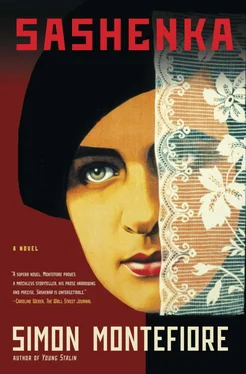I love you, Piter, she thought. The Tsar had just changed the city’s name to Petrograd because St. Petersburg was too German—but to the natives it was always St. Petersburg, or just Piter. Piter, I may never, ever see you again! Adieu, native city, adieu Papa, adieu Lala!
She quoted one of Ibsen’s heroes: All or nothing! This was her motto—and always would be.
And then there it was: the drear dark-red brick of the Kresty Prison, looming up until its shadows swallowed her. For a moment the great walls towered over the little sleigh as the gates swung open and then clanged shut behind her.
Not so much a building, more of a tomb.
The Delaunay-Belleville careered down Suvorovsky and Nevsky prospects with Pantameilion at the wheel and pulled up outside the Zeitlin family house, a Gothic façade of Finnish granite and ocher, on Bolshaya Morskaya, or Greater Maritime Street. Weeping, Lala opened the front door into a hall with a checkered floor, almost falling onto three girls who, with cloths tied to their hands and knees, were polishing the stone on all fours.
“Hey, your boots are filthy!” howled Luda the parlormaid.
Lala’s shoes left melted slush on the gleaming floors but she did not care. “Is the baron at home?” she asked. One of the girls nodded sulkily. “And the baroness?”
The girl glanced upstairs and rolled her eyes—and Lala, trying not to slip on the damp stone, ran to the study door. It was open.
A mechanical sound like the shunt of a locomotive came from inside.
Delphine, the surly and ancient French cook, was getting her menu approved. A wife would normally take care of such matters—but not in this uneasy house, as Lala was well aware. The color of a wax candle, as thin as a broomstick, Delphine always had a drip on the end of her long nose, which hung perilously over the dishes. Lala remembered Sashenka’s fascination with it. What happens if it falls into the borscht? she’d ask, her grey eyes sparkling.
“ They don’t help you, mon baron ,” the cook was saying, haggard in her creased brown uniform. “I’ll talk to them if you like, sort them out.”
“Thank you, Delphine,” said Baron Zeitlin. “Come in, Mrs. Lewis!” The cook stood up straight like a birch tree, stiffened proudly and passed the nanny without a glance.
Inside the baron’s study, Lala could savor the leather and cigars even through her tears. Dark and lined with walnut, the room was crammed with expensive clutter and lit by electric lights in flounced green shades. Palms seemed to sprout up every wall. Portraits suspended on chains from the ceiling looked down on sculpted heads, small figurines in frock coats and top hats, and signed sepia photographs of the Emperor and various Grand Dukes. Ivory fans, camels and elephants mingled with oval cameos lined up on a baize card table.
Baron Samuil Zeitlin was sitting in a strange contraption that shook rhythmically like a trotting horse as he manipulated its polished steel arms, his hands on the wooden handles, his cheeks slightly red, a cigar stub between his teeth. The Trotting Chair was designed to move the baronial bowels after meals.
“What is it, Mrs. Lewis? What’s happened?”
Trying not to sob, she told him, and he jumped straight off the Trotting Chair. Lala noticed that his hands were shaking slightly as he relit the cigar that never left his mouth. He questioned her closely, all business. Zeitlin alone decided when their conversations would be warm and when they would be cold. Not for the first time, Lala pitied the children of people of quality who could not love like more middling people.
Then, taking a deep breath, she looked at her employer, at the intense gaze of this slim, handsome man with the fair mustache and Edward VII beard, and realized that if anyone could be trusted to bring her Sashenka home, the baron could.
“Please stop crying, Mrs. Lewis,” said Baron Zeitlin, proprietor of the Anglo-Russian Naphtha-Oil Bank of Baku and St. Petersburg, handing her a silk handkerchief from his frock coat. Calmness in moments of crisis was not just a requirement of life and a mark of civilization but an art, almost a religion. “Crying won’t get her out. Now sit down. Gather yourself.”
Zeitlin saw Lala take a breath, touch her hair and smooth down her dress. She sat, hands together, bracing herself, trying to be calm.
“Have you mentioned this to anyone else in the house?”
“No,” replied Lala, whose heart-shaped face seemed to Zeitlin unbearably appealing when decorated with her crystal tears. Only her high voice failed to fit the picture. “But Pantameilion knows.”
Zeitlin walked back round his desk and pulled a velvet bellrope. The parlormaid appeared, a light-footed peasant girl with the snub nose that marked her as a child of the family estates in Ukraine.
“Luda, ask Pantameilion to decarbonize the Pierce-Arrow in the garage,” said Zeitlin.
“Yes, master,” she said, bowing slightly from the waist: peasants from the real countryside still bowed to their masters, Zeitlin reflected, but nowadays those from the cities just sneered.
As Luda closed the study door, Zeitlin sank down in his high-backed chair, pulled out his green leather cigar box with the gold monogram and absentmindedly drew out a cigar. Stroking the rolled leaves, he eased off the band and smelled it, drawing the length of it under his nose and against his mustache so that it touched his lips. Then with a flash of his chunky cufflinks, he took the silver cutter and snipped off the tip. Moving slowly and sensuously, he flipped the cigar between finger and thumb, spinning it round his hand like the baton of the leader of a marching band. Then he placed it in his mouth and raised the jeweled silver lighter in the shape of a rifle (a gift of the War Minister, for whom he manufactured the wooden stocks of rifles for Russian infantrymen). The smell of kerosene rose.
“ Calme-toi , Mrs. Lewis,” he told Lala. “Everything’s possible. Just a few phone calls and she’ll be home.”
But beneath this show of confidence, Zeitlin’s heart was palpitating: his only child, his Sashenka, was in a cell somewhere. The thought of a policeman or, worse, a criminal, even a murderer, touching her gave him a burning pain in his chest, compounded by shame, a whiff of embarrassment, and a sliver of guilt—but he soon dismissed that. The arrest was either a mistake or the fruit of intrigue by some jealous war contractor—but calm good sense, peerless connections and the generous application of gelt would correct it. He had fixed greater challenges than releasing an innocent teenager: his rise from the provinces to his current status in St. Petersburg, his place on the Table of Ranks, his blossoming fortune, even Sashenka’s presence at the Smolny Institute, all these were testament to his steely calculation of the odds and meticulous preparation, easy luck, and uninhibited embrace of his rightful prizes.
“Mrs. Lewis, do you know anything about the arrest?” he asked a little sheepishly. Powerful in so many ways, he was vulnerable in his own household. “If you know something, anything that could help Sashenka…”
Lala’s eyes met and held his through the grey smoke. “Perhaps you should ask her uncle?”
“Mendel? But he’s in exile, isn’t he?”
“Quite possibly.”
He caught the edge in a voice that always sounded as if it were singing a lullaby to a child, his child, and recognized the glance that told him he hardly knew his own daughter.
“But before his last arrest,” she continued, “he told me this house wasn’t safe for him anymore.”
“Not safe anymore…,” murmured Zeitlin. She meant that the secret police were watching his house. “So Mendel has escaped from Siberia? And Sashenka’s in contact with him? That bastard Mendel! Why doesn’t anyone tell me anything?”
Читать дальше












